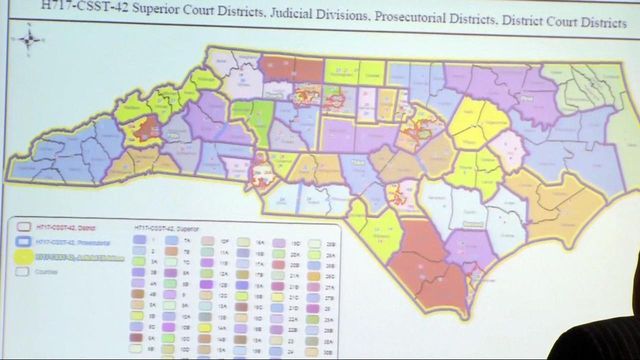House panel OKs new judicial districts
A House committee approved a statewide proposal for new election districts for District Court and Superior Court judges and for prosecutors, the first such comprehensive overhaul in more than 50 years.
Posted — UpdatedChairman Rep. Justin Burr, R-Stanly, is the sponsor of House Bill 717. He said many counties haven't updated their districts in years to account for population changes, leaving some districts with far more constituents than others. As an example, he offered Mecklenburg County, where one Superior Court district has as many residents as the other two districts put together.
"That's a huge gap, a real imbalance and a real injustice to the people of that county, and I believe it needs to be fixed," Burr said.
Rep. Joe John, D-Wake, a retired judge, pointed out that, in many of the state's urban areas, the proposed maps concentrate African-American voters in one judicial district, leaving others with few black voters. For example, in Cumberland County, all 11 precincts with 40 percent or more African-American voters are in one judicial district, while the other district has none. In Forsyth County, 18 out of 20 precincts with a high population of African-Americans are lumped into one district, leaving two other districts with one such precinct and one district with none.
Burr said that he had tried to follow existing district lines where possible and to take into account the requests of local judges and legal leaders.
"I did not take into account race when redrawing the maps that are before you. It was not a factor in redrawing these districts," he repeatedly told the committee.
Similar racial imbalances used in drawing legislative maps caused federal judges to rule them unconstitutional and order lawmakers to redraw their districts last month. Asked whether he thinks his proposal will pass constitutional muster, Burr said he believes it will.
Rep. Sarah Stevens, R-Surry, also denied that race was a factor. She said the proposal splits some whole-county districts into specific districts to give rural voters more of a say.
"The heart of the city controls who all the judges are," Stevens said. "I don’t think it’s a bad thing for various people from various areas of the county, from various walks of life, to have the opportunity to run for judge.
"We’re not attempting to pack some area very small and very tight to keep somebody from getting elected," she said.
Rep. Marcia Morey, D-Durham, a former District Court judge, asked why the state Courts Commission had not been tasked with the overhaul. The commission was created after the last major overhaul in the 1960s.
"At the end of the day, the buck stops here with all of us," Burr responded. "The existing districts are not fair to the voters of North Carolina."
Rep. Darren Jackson, D-Wake, said the new maps treat voters in Republican- and Democratic-leaning counties in different ways. For example, Johnston County voters will be able to vote on all 12 of their District Court judges under the new proposal, while voters in Guilford County would be able to vote for only three of 15.
"It’s clear that we’re dividing up counties that tend to vote Democratic," Jackson said.
Members of the public who spoke during the hearing were unanimously critical of the proposal as well as the lawmakers who authored it and the process they used.
Lekha Shupeck with the left-leaning group Together We Will NC said a statistical analysis of the maps reveals their partisan slant.
"Nearly 40 percent of Superior Court judges who identify as Democrats will be double-bunked. By contrast, only 12 percent of judges who identify as Republicans will be forced to compete in this way," Shupeck told lawmakers. "This appears to be an effort to push Democratic judges out of office while giving a partisan advantage to Republicans."
Orange County voter Becca Zerkin urged the panel to table the bill and allow the Courts Commission to study the issue and make recommendations.
"You’ve rushed this plan against the advice of judges and the legal community," Zerkin said. "You've tried your best to take power from the executive branch, you’ve tried to gerrymander your way to a stranglehold on the legislative branch, and now you’re after the judicial branch – the branch we trust to be impartial above all others."
Morey called the process "rushed," pointing out that the bill wasn't even available to committee members until late Monday.
"I think we do need to make some changes, but it needs to be done in a much more thoughtful manner," she said.
"If we keep saying 'Now's not the right time to go,' we'll just never go," responded Rep. David Lewis, R-Harnett.
"These are significant changes," agreed Rep. John Blust, R-Guilford, "but I don't think it's accurate to call this a total remake of the judiciary."
Stevens, who serves as House speaker pro tem, told the committee she expects the House will pass the maps during its October session next week, but she predicted there would be more time to consider the proposal before the state Senate takes it up.
Related Topics
• Credits
Copyright 2024 by Capitol Broadcasting Company. All rights reserved. This material may not be published, broadcast, rewritten or redistributed.






